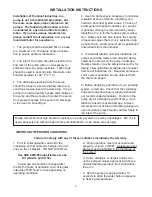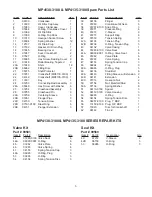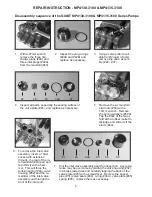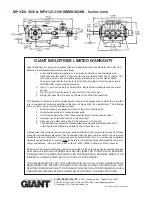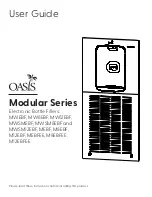
9
29. Replace any shims (#20A) and position the bearing cover (#14) as before. Tighten the bearing cover
bolts (#17) evenly to position the bearing race. Torque the bolts to 125 inch-pounds. Once the crank-
shaft reassembly is complete, oil the crankshaft races freely before replacing the connecting rod (#24)
end caps.
30. Reassemble the connecting rods (#24), matching the numbered (or colored) halves. Torque the con
-
necting rod bolts (#24A) to 250 inch-pounds (28 Nm).
31. To replace the oil seal (#31) apply locktite to the outside edges of the seal and install from the front of
the crankcase (#1). The side of the seal with the spring must face the oil. Make sure that the face of
the seal is flush with the crankcase.
32. Inspect the ceramic plungers (#29B) and replace them if
necessary. Clean the ends of the ceramic and remount
onto the crosshead/plunger assembly. Make certain that
the end of the plunger which is not counter-bored is fac-
ing the discharge side of the pump. Install the seal wash-
er (#29D) on the bolt assembly.
33. Clean the bolt threads (#29C), ap
-
ply locktite, and remount.
29B 29D 29C
36. Reassemble the dis
-
charge valve assembly
by placing the valve plate
(#45), spring (#46), and
spring retainer (#47) on
top of the valve seat (#44).
Press fit together.
33a.Torque the ceramic
plunger bolt assembly to
300 inch-pounds (34 Nm).
If originally removed, rein-
stall the stud bolts (#49).
34. Install the rear support
ring (#41), rear v-sleeve
(#40), rear pressure ring
(#39). Install the snap ring
(#36).
35. Reinstall the pressure ring (#39),
v-sleeves (#40) and support ring
(#41) into each plunger bore. Re-
install the tension spring (#42).
39 40 40 41


